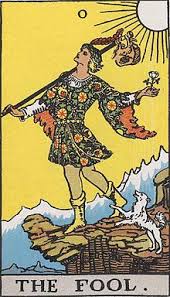记忆方法
将“fool”分解为“foo”(想象一个滑稽可笑的小丑,类似于中国的小丑形象,脸上涂着油彩)加上“-l”表示这个“小丑”或“foo”是搞笑的、愚蠢的。通过这样的联想,记忆“fool”作为愚蠢的人或行为就变得容易了。
以上内容由AI生成, 仅供参考和借鉴
中文词源
fool 傻瓜
来自拉丁语follis, 风箱,皮袋,词源同bellows. 特指铁匠的鼓风袋,后来词义引申为夸夸其谈的人,笨蛋,傻瓜,等。
英语词源
- fool
-
fool: [13] Fool comes via Old French fol from Latin follis, which originally meant ‘bellows’ (and may come ultimately from Indo-European *bhel-, which produced English bellows). In post-classical times it developed semantically via ‘windbag’ and ‘fatuous person’ to ‘idiot’. Fool ‘dessert of puréed fruit and cream’ [16] appears to be the same word, applied (like trifle) to a light insubstantial dessert. Folly [13] comes from the Old French derivative folie.
=> folly - fool (n.1)
- early 13c., "silly, stupid, or ignorant person," from Old French fol "madman, insane person; idiot; rogue; jester," also "blacksmith's bellows," also an adjective meaning "mad, insane" (12c., Modern French fou), from Medieval Latin follus (adj.) "foolish," from Latin follis "bellows, leather bag" (see follicle).
The sense evolution probably is from Vulgar Latin use of follis in a sense of "windbag, empty-headed person." Compare also Sanskrit vatula- "insane," literally "windy, inflated with wind." But some sources suggest evolution from Latin folles "puffed cheeks" (of a buffoon), a secondary sense from plural of follis. One makes the "idiot" sense original, the other the "jester" sense.The word has in mod.Eng. a much stronger sense than it had at an earlier period; it has now an implication of insulting contempt which does not in the same degree belong to any of its synonyms, or to the derivative foolish. [OED]
Also used in Middle English for "sinner, rascal, impious person" (late 13c.). Meaning "jester, court clown" in English is attested c. 1300, though it is not always possible to tell whether the reference is to a professional entertainer counterfeiting mental weakness or an amusing lunatic, and the notion of the fool sage whose sayings are ironically wise is also in English from c. 1300. The French word probably also got into English via its borrowing in the Scandinavian languages of the vikings (Old Norse fol, Old Danish fool, fol).There is no foole to the olde foole ["Proverbs of John Heywood," 1546]
To make a fool of (someone) "cause to appear ridiculous" is from 1620s (make fool "to deceive, make (someone) appear a fool" is from early 15c.). Feast of Fools (early 14c., from Medieval Latin festum stultorum) was the burlesque festival celebrated in some churches on New Year's Day in medieval times. Fool's gold "iron pyrite" is from 1829. Fool's paradise "illusory state of happiness" is from mid-15c. Fool-trap is from 1690s. Foolosopher, a useful insult, is in a 1549 translation of Erasmus. Fool's ballocks is described in OED as "an old name" for the green-winged orchid. Fool-killer "imaginary personage invested with authority to put to death anybody notoriously guilty of great folly" is from 1851, American English.Fool killer, a great American myth imagined by editors, who feign that his or its services are greatly needed, and frequently alluded to as being "around" or "in town" when some special act of folly calls for castigation. Whether the fool-killer be an individual or an instrument cannot always be gathered from the dark phraseology in which he or it is alluded to; but the weight of authority would sanction the impersonal interpretation. [Walsh, "Handy-Book of Literary Curiosities," 1892]
- fool (v.)
- mid-14c., "to be foolish, act the fool," from fool (n.1). The transitive meaning "make a fool of" is recorded from 1590s. Sense of "beguile, cheat" is from 1640s. Also as a verb 16c.-17c. was foolify. Related: Fooled; fooling. Fool around is 1875 in the sense of "pass time idly," 1970s in sense of "have sexual adventures."
- fool (adj.)
- c.
权威例句
- 1. People always think I'm a fool, and I dare say they're right.
- 人们总认为我是个傻瓜,想必他们是对的。
- 2. I'd been a fool letting him snow me with his big ideas.
- 我真蠢,居然被他的胡乱吹嘘给蒙蔽了。
- 3. I was a fool to have let her talk me into it.
- 我真笨,竟然听从了她的劝说。
- 4. He has simply been exposed as an adulterer and a fool.
- 有人揭发他就是个奸夫和白痴。
- 5. He'd been a fool to get involved with her!
- 他竟然跟她扯到了一起,真是傻瓜!

